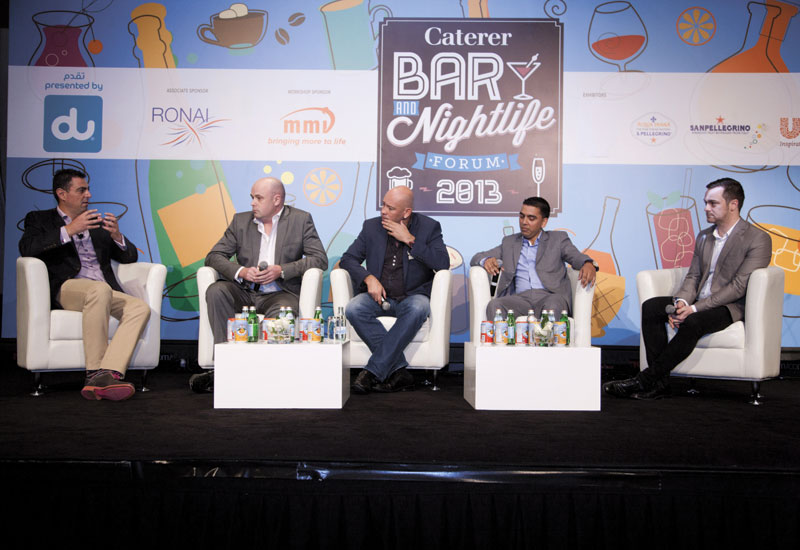WORKING NIGHTS
The next issue dealt on the day continued with the training and workforce topic. Titled ‘Building a High Performance Workforce’, moderated by Gates Hospitality CEO Naim Maadad, who was joined on stage by Hakkasan Dubai beverage manager Angus McGregor; The Act Dubai general manager Jean Marc Petrus; Sheraton Mall of the Emirates outlets manager Dinesh Tewari; and Conrad Dubai operations manager Richard Haddon.
The panel got its teeth into the idea of venues that seem to mushroom overnight — which ones will have more staying power than others and how do you get that X factor that makes an outlet successful? Haddon kicked off the debate by outlining the hotel’s strategy to spend more on more experienced staff, as most hotels “hire 10 people on low wages to do one person’s job”. The hotel has also flown in bartenders and, according to Haddon: “people you would never normally see working in a hotel in Dubai” from Europe. “It’s quite refreshing to see things have moved forward from the way things have been,” he added.

| Advertisement |
Petrus said it was important to look after the employees well — housing, transportation access, and time to explore the city. Training was quickly considered as well, and he said: “You can spend a lot of money on training, but you can’t replace personality.” This would be important to decide which position to place your employees in. In addition, there should always be the option for growth and training in different areas of the venue.
Haddon agreed, and admitted that there are people in the industry who go far because they take it so seriously, but from a customer-perspective, if they have the right personality then it’s easy to train them.
Maadad then declared that Dubai has become too used to having a ‘subservient’ service culture. Petrus raised a chuckle from the audience when he replied to this with: “Human beings are sheep.” He added that people like to be engaged and told, with the future of service moving from a ‘master-servant’ dynamic, to become more personal on first name basis.
Tewari said that when making hiring decisions, it’s important to decide whether each person is fit for the job or not, and whether he or she has the passion for the job. “As far as empowerment is concerned, I give my employees the freedom to make decisions,” he added.
Maadad asked the panellists what was the magic secret to keeping people for a long period of time. Petrus said it was about open lines of communication, where more approachable workplaces are a draw for people.
If staff members can be enticed away with 100 dirhams, then it speaks about the mentality of the employers, according to McGregor. He added that independent venues can get rid of the HR department system and deal with staff at a one-on-one basis. This has caused staff turnover at the restaurant to fall as staff enjoy the environment that they work in.
“The Dubai marketplace is opening up, and new operators are bring a new ethos. I think in some respects the market place in Dubai has been at a standstill for a while, so it’s nice for us to be moving forward,” McGregor added.
Haddon joined in and revealed that since pre-opening the Conrad Dubai has lost one person out of a staff of 150. However, he predicted that he will eventually lose staff to independent venues who typically spend more on staff than hotels.
Maadad went on to ask at this point when will hotels make the move to match independent pay scales, and realise that they don’t need 100 cheap staff but some that know their job well.
Haddon said each restaurant in the Conrad Dubai has its own budget to allow for hiring the right staff. “Some hoteliers don’t have the experience of working in an independent background and stepping outside the SOPs,” he added. “They are coming around to see that you don’t need 10 people to do one person’s job.”









 Search our database of more than 2,700 industry companies
Search our database of more than 2,700 industry companies









